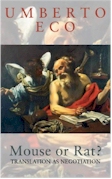Umberto Eco on translation

Sense for sense and not word for word, negotiation is the key to good translation.This is an edited extract from Mouse or Rat? Translation as Negotiation by Umberto Eco, published by Weidenfeld & Nicolson on November 13, 2003.
Irrespective of the fact that some philosophers or linguists claim there are no rules for deciding whether one translation is better than another, everyday activity in a publishing house tells us that it is easy to establish that a translation is wrong and deserves severe editing. Maybe it is only a question of common sense, but common sense must be respected.
Let us suppose that in a novel a character says, "You're just pulling my leg." To render such an idiom in Italian by "stai solo tirandomi la gamba" or "tu stai menandomi per la gamba" would be literally correct but misleading. In Italian, one should say "mi stai prendendo per il naso", thus substituting an English leg with an Italian nose.
If literally translated, the English expression, absolutely unusual in Italian, would make the reader suppose that the character (as well as the author) was inventing a provocative rhetorical figure - which is completely misleading, as in English the expression is simply an idiom. By choosing "nose" instead of "leg", a translator puts the Italian reader in the same situation as the original English one.
Thus only by being literally unfaithful can a translator succeed in being truly faithful to the source text. Which is (to redeem the triviality of my example) like echoing Saint Jerome, patron saint of translators, that in translating one should not translate "verbum e verbo sed sensum exprimere de sensu" (sense for sense, and not word for word) - even though the notion of the right sense of a text can imply some ambiguities.
In the course of my experiences as a translated author I have always been torn between the need to have a translation that respected my intentions, and the exciting discovery that my text could elicit unexpected interpretations and be in some way improved when it was re-embodied in another language.
What I want to emphasise is that many concepts circulating in translation studies (such as adequacy, equivalence, faithfulness) can also be considered from the point of view of negotiation. Negotiation is a process by virtue of which, in order to get something, each party renounces something else, and at the end everybody feels satisfied since one cannot have everything.
For example, there is no exact way to translate the Latin word "Mus" into English. In Latin "Mus" covers the same semantic space covered by "mouse" and "rat" in English - as well as in French, where there is "souris" and "rat", in Spanish ("ratón" and "rata") or in German ("maus" and "ratte"). But in Italian, even though the difference between a "topo" or, more unusually a "sorcio", and "ratto" is recorded in dictionaries, in everyday language one can use "topo" even for a big rat - perhaps stretching it to "topone" or "topaccio" - but "ratto" is used only in technical texts. So what happens when we find the word "topo" in an Italian translation of a French text? Does it translate back as "rat" or "souris"?
Take the first chapter of Camus' La peste in the Italian translation by Beniamino dal Fabbro. It states that one morning, Doctor Rieux found, on the stairs of the building, "un sorcio morto". Now "sorcio" is like "topo", and like "mouse" in English, and if one knows that mouse in French is souris one can infer that the Italian translator chose "sorcio" instead of "topo" because he was phonically influenced by the French "souris". In spite of these obvious assumptions, one is tempted to reflect on the fact that Camus' novel is telling the story of a terrible epidemic, and the plague is not usually carried by mice but by rats.
Thus, not because of linguistic competence, but by virtue of general knowledge, one is encouraged to think that the translator made a mistake. As a matter of fact, if you check the French original, you will see that Camus does not mention a mouse but "un rat". This is an instance in which the Italian translator should have stressed the difference and mentioned, if not a "ratto", at least a "grosso topo" or a "topo di chiavica".
Read more:
The Guardian Unlimited - Books Extracts



